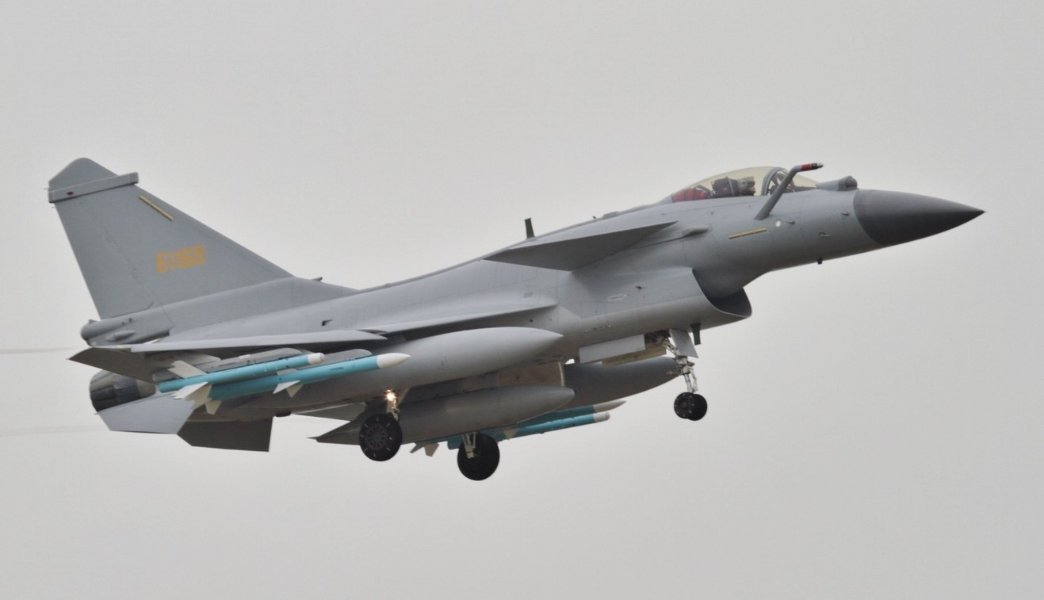-
Posts
45,985 -
Joined
-
Last visited
About Rimmer
Profile Information
-
Location
Picking bluegrass music on the Mining spacecraft, the Red Dwarf.
Previous Fields
-
Location
Mining ship Red Dwarf
Recent Profile Visitors
103,795 profile views
Rimmer's Achievements
-
Wind River is VERY good, have watched it twice Another Taylor Sheriden movie not to be missed is Sicario
-

USA Apollo 13 Astronaut Jim Lovell Dies at 97 After Stellar Life
Rimmer replied to webfact's topic in World News
Troll post removed -

Opinion Iran shouldn’t count on China to boost its air force
Rimmer posted a topic in Political Soapbox
Iran shouldn’t count on China to boost its air force A J-10B carrying PL-8 and PL-12 air-to-air missiles landing at Zhuhai Jinwan airport ahead of Airshow China 2018. The 12-day Israeli air campaign in June was a test of technological dominance. It was a quick and massive victory for Israel and for the U.S. The war severely crippled Iran’s military, exposing critical weaknesses in its air defenses and aging air force. Iran’s fleet of Cold War-era jets was no match for Israeli stealth fighters, allowing Israel to quickly achieve air superiority. This dominance enabled Jerusalem to decimate Iran’s military leadership and destroy key nuclear and military sites. In response to these vulnerabilities, Tehran is now planning to acquire Chinese J-10C fighter jets to modernize its air force and reassert control over its airspace. Full story: https://thehill.com/opinion/international/5440797-iran-china-fighter-jets/ -
Weapons Could be one to look out for: https://collider.com/weapons-review-zach-cregger-josh-brolin-julia-garner/
-
Good Cop/Bad Cop It can be found on tPB https://www.yahoo.com/entertainment/articles/prime-video-popular-mystery-show-090525745.html
-
Honda Is Giving Up on the All-Electric Dream Citing massive losses and a cooling market, the Japanese auto giant is backing away from an all-electric future in a huge blow to the EV industry and a sign that the road to clean cars just got a lot bumpier. Honda just dealt a huge blow to the all-electric dream. In a stunning reversal, the Japanese auto giant has announced it is rethinking its electrification strategy, signaling that battery-electric vehicles (BEVs) are no longer the holy grail of its future. The move is a major setback for the EV industry, which is already reeling from the September 30 expiration of federal tax credits that made electric cars competitive with their gas-powered counterparts. For years, the auto industry, mesmerized by the success of Tesla, has been in an arms race to go all-electric. Now, one of its biggest players is pumping the brakes. Hard. “BEVs are not the goal, better electric vehicles are a pathway to achieving carbon neutral, not necessarily the only pathway,” Honda Australia president and CEO, Jay Joseph, recently told the publication Drive. “BEVs will continue to improve, we’re working on solid-state batteries, but our goal is carbon neutral, not battery electric vehicles.” Full story: https://gizmodo.com/honda-is-giving-up-on-the-all-electric-dream-2000640532
-
Humans Could Live For 1,000 Years by 2050—Ushering in the Dawn of ‘Practical Immortality,’ Futurists Say Technology futurists foresee advances that will enable humans to live up to 1,000 years. They anticipate breakthroughs in AI, robotics, and digital consciousness transfer that could make “practical immortality” a reality by mid-century. A “techno-optimism” mindset fuels these predictions, but critics warn technology can’t address every problem and may create new ones, like unequal access. Some futurists believe that humanity is edging closer than ever to the possibility of “practical immortality.” These tech visionaries aren’t looking at an increased lifespan in the same way as mainstream longevity researchers, though, who are working to slow aging so we can live for up to a century in relatively good health. Instead, we can extend our natural lifespan by a factor of ten, according to science, technology, and medical visionaries like Ray Kurzweil, Ian Pearson, and Aubrey de Grey. Full Story: https://www.popularmechanics.com/science/a65637132/immortality-singularity/
-

Updates and events in the War in Ukraine 2025
Rimmer replied to cdnvic's topic in The War in Ukraine
Crop Duster Armed With Air-To-Air Missiles Appears In Ukraine A Czechoslovakian-made agricultural plane toting Soviet-era heat-seeking missiles is Ukraine’s latest drone-killer. The apparent latest addition to Ukraine’s growing series of ad-hoc anti-drone measures is one of its most impressive so far: a propeller-driven agricultural aircraft toting infrared-guided air-to-air missiles under the wings. While the operational status of the modified aircraft is unknown, the development highlights continued Ukrainian innovation in terms of extemporized air defense systems and the use of repurposed legacy missiles. The turboprop-powered Zlin Z-137 Agro Turbo is seen swooping low over a Ukrainian cornfield, very much its traditional operating environment. In this case, however, it sports a single R-73 air-to-air missile under each wing. The agricultural plane also appears to have received a military-style dull gray overall paint scheme, with white identification stripes on the rear fuselage to reduce the risk of ‘friendly fire.’ Details of the date and location of the video are not immediately available. Full story and video: https://www.twz.com/air/crop-duster-armed-with-air-to-air-missiles-appears-in-ukraine -

Updates and events in the War in Ukraine 2025
Rimmer replied to cdnvic's topic in The War in Ukraine
Russia has built a massive drone factory to pump out Iranian-designed drones. Now it’s leaving Tehran out in the cold “Finally, something no one else has,” a Russian journalist says during a TV documentary on the country’s largest drone factory. “Such mass production of two-stroke engines doesn’t exist anywhere else in Russia.” The factory in question, Alabuga, 600 miles east of Moscow in Russia’s Tatarstan region, has been pumping out increasing numbers of the Iranian-designed Shahed-136 attack drone (known in Russia as Geran), but the man behind the site believes this may be one of its greatest achievements. “This is a complete facility,” CEO Timur Shagivaleev adds in the documentary, explaining most of the components for the drone are now produced locally. “Aluminium bars come in, engines are made from them; microelectronics are made from electric chips; fuselages are made from carbon fiber and fiberglass – this is a complete location.” Full story: https://edition.cnn.com/2025/08/08/europe/russia-drone-factory-iran-intl Related: https://edition.cnn.com/2025/07/25/europe/russia-secretive-drone-factory-rapid-expansion-intl -

Updates and events in the War in Ukraine 2025
Rimmer replied to cdnvic's topic in The War in Ukraine
Russia's rumored jet-powered versions of the Iranian Shahed are appearing in Ukraine's air defense reports Ukrainian reports are starting to document the use of Russia's new jet-propelled Shahed drones. One version, unofficially dubbed the Geran-3, is said to fly up to 500 miles per hour. Such speeds would pose key problems for Ukraine's air defenses if jet drones are launched en masse. https://www.businessinsider.com/russias-rumored-jet-powered-geran-iranian-shaheds-appearing-ukraine-2025-8 -

What Putin Really Wants from His Upcoming Meeting with Trump
Rimmer replied to bannork's topic in The War in Ukraine
Putin is stuck in a war he started but can’t seem to end. Pulling out of Ukraine would shatter his image of strength, invite internal backlash, and possibly trigger the political unraveling of his regime. But dragging the war on bleeds Russia economically, militarily, and diplomatically. Sanctions bite, casualties mount, and global isolation deepens. It’s a classic autocrat’s paradox: peace means humiliation, but war means slow-motion collapse. He’s gambling that time will wear down the West before it breaks him. But each day the war continues, the cracks in the Kremlin get harder to hide. While Putin projects iron control, behind closed doors the Kremlin isn’t as unified as it looks. Whispers of doubt are growing louder among elites, oligarchs losing fortunes, generals losing troops, and technocrats watching the economy sink under sanctions. Nobody dares challenge him openly yet, but loyalty in Russia often runs on fear and profit, and both are running low. The longer the war drags on with no real gains, the more some in his inner circle may start weighing their own survival over his. History tells us: Russian strongmen fall fast, and always from within.- 30 replies
-
- 15
-

-

-

-

-

-
My last little female cat made it to 17 years but it was plain her time had come, so we let nature take its course. She passed peacefully one night a few weeks back in her favorite little bed/box and she now rests down the garden in our pet cemetery overlooking the pond surrounded by flowers and ten other little cat friends who have passed before her. Best way to get over it is to adopt another cat or kitten Each one of our cats that has passed has a stone tile marker with their name on it. This is my wife preparing her plot.
-
An off topic post has been removed




















